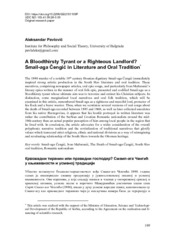A Bloodthirsty Tyrant or a Righteous Landlord? Smail-aga Čengić in Literature and Oral Tradition
Članak u časopisu (Objavljena verzija)
Metapodaci
Prikaz svih podataka o dokumentuApstrakt
The 1840 murder of a notable 19th century Bosnian dignitary Smail-aga Čengić immediately inspired strong artistic production in the South Slav literature and oral tradition. These narratives, comprising newspaper articles, oral epic songs, and particularly Ivan Mažuranić’s literary epics written in the manner of oral folk epic, presented and codified Smail-aga as a bloodthirsty tyrant whose ultimate aim was to terrorize and extinct his Christian subjects. In distinction, some marginalized local narratives and oral folk tradition, which will be examined in this article, remembered Smail-aga as a righteous and merciful lord, protector of his flock and a brave warrior. Thus, when we scrutinize several versions of oral songs about the death of Smail-aga recorded between 1845 and 1860, as well as later collected anecdotes from his native Herzegovina, it appears that his hostile portrayal in written literature was rather the contribution of the Serbian and Croatian Romantic nationalists arou...nd the mid19th-century than an actual popular perception of him among local people in the region that he lived with. In conclusion, the article advocates for a wider consideration of the overall
polyphonic narrative tradition and the revitalization of traditional narratives that glorify values which transcend strict religious, ethnic and national divisions as a way of reimagining and revaluating relationship of the South Slavs towards the Ottoman heritage.
Ključne reči:
Smail-aga Čengić / Ivan Mažuranić / The Death of Smail-aga Čengić / South Slav oral tradition / Romantic nationalismIzvor:
Glasnik Etnografskog instituta SANU, 2021, LIX, 1, 109-124Izdavač:
- Etnografski institut SANU
Finansiranje / projekti:
- Ministarstvo nauke, tehnološkog razvoja i inovacija Republike Srbije, institucionalno finansiranje - 200025 (Univerzitet u Beogradu, Institut za filozofiju i društvenu teoriju) (RS-MESTD-inst-2020-200025)
Kolekcije
Institucija/grupa
IFDTTY - JOUR AU - Pavlović, Aleksandar PY - 2021 UR - http://rifdt.instifdt.bg.ac.rs/123456789/2455 AB - The 1840 murder of a notable 19th century Bosnian dignitary Smail-aga Čengić immediately inspired strong artistic production in the South Slav literature and oral tradition. These narratives, comprising newspaper articles, oral epic songs, and particularly Ivan Mažuranić’s literary epics written in the manner of oral folk epic, presented and codified Smail-aga as a bloodthirsty tyrant whose ultimate aim was to terrorize and extinct his Christian subjects. In distinction, some marginalized local narratives and oral folk tradition, which will be examined in this article, remembered Smail-aga as a righteous and merciful lord, protector of his flock and a brave warrior. Thus, when we scrutinize several versions of oral songs about the death of Smail-aga recorded between 1845 and 1860, as well as later collected anecdotes from his native Herzegovina, it appears that his hostile portrayal in written literature was rather the contribution of the Serbian and Croatian Romantic nationalists around the mid19th-century than an actual popular perception of him among local people in the region that he lived with. In conclusion, the article advocates for a wider consideration of the overall polyphonic narrative tradition and the revitalization of traditional narratives that glorify values which transcend strict religious, ethnic and national divisions as a way of reimagining and revaluating relationship of the South Slavs towards the Ottoman heritage. PB - Etnografski institut SANU T2 - Glasnik Etnografskog instituta SANU T1 - A Bloodthirsty Tyrant or a Righteous Landlord? Smail-aga Čengić in Literature and Oral Tradition IS - 1 VL - LIX SP - 109 EP - 124 DO - 10.2298/GEI2101109P ER -
@article{
author = "Pavlović, Aleksandar",
year = "2021",
abstract = "The 1840 murder of a notable 19th century Bosnian dignitary Smail-aga Čengić immediately inspired strong artistic production in the South Slav literature and oral tradition. These narratives, comprising newspaper articles, oral epic songs, and particularly Ivan Mažuranić’s literary epics written in the manner of oral folk epic, presented and codified Smail-aga as a bloodthirsty tyrant whose ultimate aim was to terrorize and extinct his Christian subjects. In distinction, some marginalized local narratives and oral folk tradition, which will be examined in this article, remembered Smail-aga as a righteous and merciful lord, protector of his flock and a brave warrior. Thus, when we scrutinize several versions of oral songs about the death of Smail-aga recorded between 1845 and 1860, as well as later collected anecdotes from his native Herzegovina, it appears that his hostile portrayal in written literature was rather the contribution of the Serbian and Croatian Romantic nationalists around the mid19th-century than an actual popular perception of him among local people in the region that he lived with. In conclusion, the article advocates for a wider consideration of the overall
polyphonic narrative tradition and the revitalization of traditional narratives that glorify values which transcend strict religious, ethnic and national divisions as a way of reimagining and revaluating relationship of the South Slavs towards the Ottoman heritage.",
publisher = "Etnografski institut SANU",
journal = "Glasnik Etnografskog instituta SANU",
title = "A Bloodthirsty Tyrant or a Righteous Landlord? Smail-aga Čengić in Literature and Oral Tradition",
number = "1",
volume = "LIX",
pages = "109-124",
doi = "10.2298/GEI2101109P"
}
Pavlović, A.. (2021). A Bloodthirsty Tyrant or a Righteous Landlord? Smail-aga Čengić in Literature and Oral Tradition. in Glasnik Etnografskog instituta SANU Etnografski institut SANU., LIX(1), 109-124. https://doi.org/10.2298/GEI2101109P
Pavlović A. A Bloodthirsty Tyrant or a Righteous Landlord? Smail-aga Čengić in Literature and Oral Tradition. in Glasnik Etnografskog instituta SANU. 2021;LIX(1):109-124. doi:10.2298/GEI2101109P .
Pavlović, Aleksandar, "A Bloodthirsty Tyrant or a Righteous Landlord? Smail-aga Čengić in Literature and Oral Tradition" in Glasnik Etnografskog instituta SANU, LIX, no. 1 (2021):109-124, https://doi.org/10.2298/GEI2101109P . .



